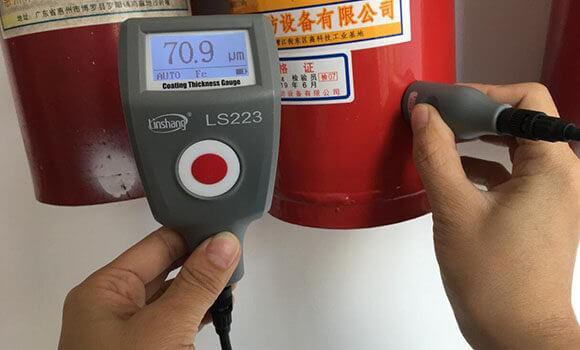Paint Thickness Gauges Test Anticorrosive Pipeline Coating Thickness
As a professional measuring instrument, the paint thickness gauge is always applied in the chemical industry. The thickness determination of some anticorrosive coatings also largely depends on the real-time display of the data. It can be said that the application of the paint thickness gauge in pipeline anticorrosion has great reference significance for technical personnel.
Normally, pipelines are used at high frequency in the chemical industry to transport oil. There are many acid and alkali salts in petroleum, which are highly corrosive. Oil will cause serious damage to the pipeline, so the anticorrosive coating on the pipeline surface plays an important role. In general, using a paint thickness gauge can accurately measure the anticorrosive coating thickness, which is convenient for timely adjustment and improvement.
The causes of pipeline corrosion come from many sources. On the one hand, water and oil can easily form a film on the pipeline surface for a long time, providing conditions for the occurrence of electrochemical corrosion. As the accumulation of impurities increases, the roughness of the pipe surface increases. In order to ensure the safety of water, oil and gas transportation, anticorrosive coatings for pipes are essential. On the other hand, the outer wall of the pipeline is prone to wear from rain and gravel. If it is exposed to the natural environment for a long time, its performance will gradually decrease with the use of time.
Corrosion inhibitor corrosion protection and conventional corrosion protection are the basic measures to solve the problem of corrosiveness of pipelines. But coating corrosion protection is a commonly used corrosion protection method in the pipeline chemical industry. The materials for pipeline anti-corrosion coating need to be highly screened. Firstly, they should have excellent insulation properties and their chemical and physical properties should be stable. Secondly, different chemical materials should be selected according to the actual conditions of the inner and outer pipelines.
Anti-corrosion coatings in professional fields generally control their thickness to a few millimeters. Excessively thick anti-corrosion coatings tend to increase the overall hardness, which is not conducive to the transmission of water and oil. The ultra-thick anticorrosive coating placed on the ground is also not conducive to daily maintenance.
It is difficult to repair and maintain and the cost is higher. Too thin anticorrosive coating will easily passivate and age pipelines, reduce the ability of abrasion and impact resistance and greatly reduce the service life of equipment. The negative impact brought by the uneven thickness of the anticorrosive coating is more significant. Due to the large impact of oil, the problem of perforation or collapse of the transported material is easy to occur, which adds a huge challenge to the transportation work.
In actual operation, we will divide the pipeline corrosion protection into outer wall corrosion and inner wall corrosion. For inner wall anticorrosion, we pay more attention to reducing the frictional resistance in the pipe and increasing the transportation capacity of water, oil and various gases. Therefore, the thickness of the normal inner wall anticorrosive coating is generally 0.038 to 0.2 mm. Such a coating has strong adhesion to the pipeline and will not easily peel off. On the surface of the outer wall anti-corrosion pipeline, we pursue high temperature dispersion and usually use high-density polyethylene material for painting.
The cathodic protection and temporary protection of pipelines by professionals are based on the standard measurement of paint thickness gauges, which often prevent the occurrence of corrosion in time and avoid large economic losses according to the standards established by the country.
- High precision coating thickness gauge for used car
- Automotive paint protection films coating thickness gauge
- Plating Thickness Measuring Instrument for Detecting Anti-corrosion Coating
- Linshang LS220, LS191, LS160A– Necessary for Car Cover Inspection
- Coating Thickness Gauge for Second Hand Vehicle
- Zero Adjustment Step of Coating Thickness Gauge
